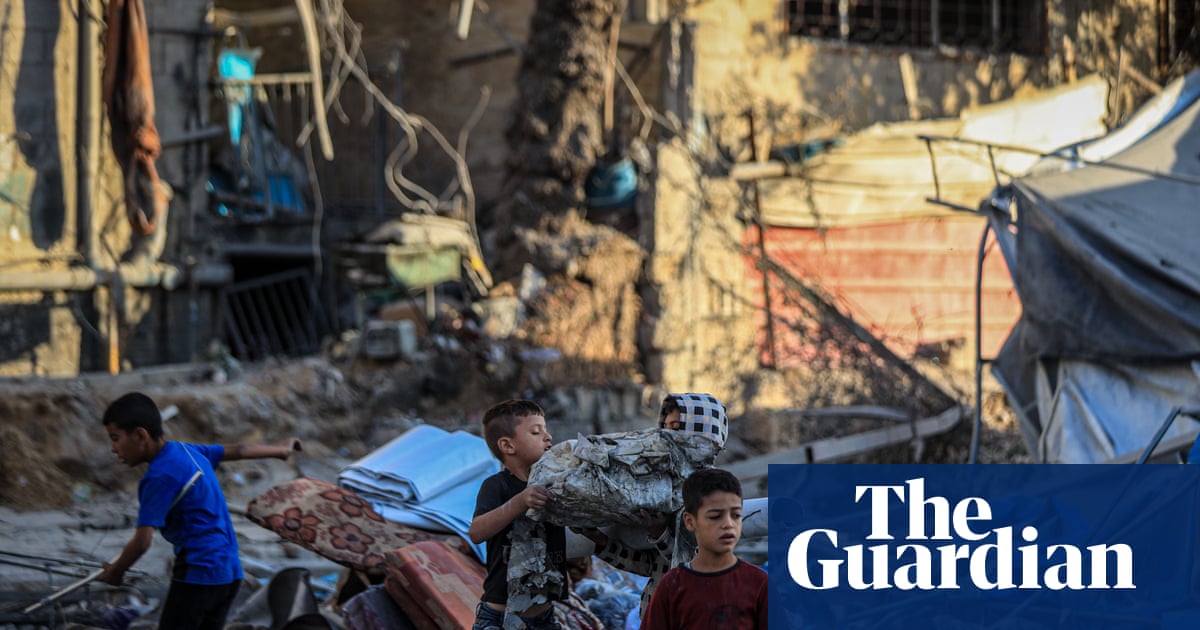The UK has not concluded that Israel is committing genocide in Gaza, nor that any of the British-made parts for F-35 jets sold to Israel have directly led to breaches of international humanitarian law, ministers have told parliament.
Ministers have also rejected calls for an independent audit of UK arms sales, but admitted they were not in a position to say if Israel’s assault in Gaza had led to any breaches of humanitarian law owing to the complexity of the fighting terrain.
They rejected a proposal that the crime and policing bill for England and Wales be amended to make it easier to prosecute foreign nationals in the UK courts suspected of war crimes, including deprivation of aid or the killing of aid workers, a change that would make it easier for Israeli government leaders to be arrested if they visited the UK.
Israel’s president, Isaac Herzog, is due to visit London on Wednesday, where he will give an address and visit No 10.
The UK government’s position came in a letter to Sarah Champion, the chair of the international development select committee, from David Lammy, who was foreign secretary until last week, in response to recommendations from the committee in a report on protecting humanitarian workers.
The government said it was still studying the implications for the British government policy of a provisional finding by the UN international court of justice (ICJ) that Israel’s occupation of Palestine was unlawful.
Those findings were published in June 2024, and the court urged governments to act on them. Ministers say they are still studying the non-binding ruling “with seriousness and rigour”.
The government’s assertion that Israel is not committing genocide is likely to be controversial within the Labour party. Ministers have taken different positions, sometimes claiming only the ICJ can determine whether a genocide is occurring, at other times staging internal departmental assessments, revealed in UK domestic courts, that a genocide is not under way and women and children are not being targeted.
In a letter to Champion, Lammy says: “The high civilian casualties including women and children and the extensive destruction in Gaza are utterly appalling. As per the genocide convention the crime of genocide only occurs where there is ‘specific intent to destroy in whole or in part a national, ethnic, racial or religious group’. The government has not concluded that Israel is acting with that intent.”
The formulation that ministers have carefully considered the risk of a genocide goes closer to the government accepting responsibility for determining if a genocide is occurring, rather than simply referring the issue to a final determination by the ICJ in some years’ time.
Two leading human rights organisations based in Israel, B’Tselem and Physicians for Human Rights, said in July that Israel was committing genocide against Palestinians in Gaza, joining a number of international and Palestinian groups who had described the war as genocidal.
Last month hundreds of employees of the UN’s leading human rights agency backed an internal letter demanding its leadership declare Israel’s offensive a genocide.
Israel denies is it carrying out a genocide, and says the war in Gaza is one of self-defence.
The finding that Israel is not acting with intent to commit a genocide, Lammy implies in his letter, absolves ministers of a duty to act on the responsibility to prevent one, set out in the 1948 genocide convention. That duty is triggered, Lammy writes in his letter, only “when the UK learns, or should normally have learned, of the existence of a serious risk of genocide”.
In an analysis that makes it easier for the government to avoid taking a view on many of the alleged individual atrocities committed in Gaza, ministers told the select committee they “cannot provide a running commentary on possible breaches of international humanitarian law in situations of conflict. Determining whether violations of IHL have occurred in the conduct of hostilities, for example, depends upon detailed knowledge of the facts of the specific military operation, including the precise nature of the target, the methods used to attack, the attacking party’s knowledge at the time and the anticipated military advantage in launching that attack. This is information to which the Foreign Office does not readily have access”.
It adds: “Harm to civilians and civilian infrastructure is a tragic aspect of armed conflict, but does not in itself mean that IHL has been violated or that war crimes have been committed, particularly in circumstances where parties to a conflict are embedded among the civilian population and in civilian infrastructure.”

